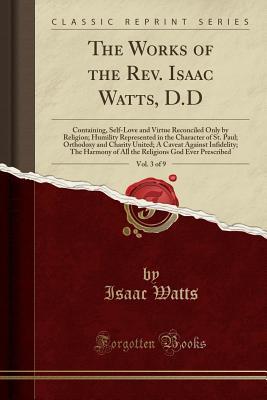Excerpt from The Works of the Rev. Isaac Watts, D.D, Vol. 3 of 9: Containing, Self-Love and Virtue Reconciled Only by Religion; Humility Represented in the Character of St. Paul; Orthodoxy and Charity United; A Caveat Against Infidelity; The Harmony of All the Religions God Ever Prescribed
Inn I. The Subatance of the Gospel II. The Form of the Gospel III. (joe of the Moral Law under the Gospel IV. Nieteten Ways of Coming to God without Christ V. A Sinner coming to God by Chriet VI. Manifold Salvation by Christ.
About the Publisher
Forgotten Books publishes hundreds of thousands of rare and classic books. Find more at www.forgottenbooks.comwww.forgottenbooks.com
This book is a reproduction of an important historical work. Forgotten Books uses state-of-the-art technology to digitally reconstruct the work, preserving the original format whilst repairing imperfections present in the aged copy. In rare cases, an imperfection in the original, such as a blemish or missing page, may be replicated in our edition. We do, however, repair the vast majority of imperfections successfully; any imperfections that remain are intentionally left to preserve the state of such historical works.
Inn I. The Subatance of the Gospel II. The Form of the Gospel III. (joe of the Moral Law under the Gospel IV. Nieteten Ways of Coming to God without Christ V. A Sinner coming to God by Chriet VI. Manifold Salvation by Christ.
About the Publisher
Forgotten Books publishes hundreds of thousands of rare and classic books. Find more at www.forgottenbooks.comwww.forgottenbooks.com
This book is a reproduction of an important historical work. Forgotten Books uses state-of-the-art technology to digitally reconstruct the work, preserving the original format whilst repairing imperfections present in the aged copy. In rare cases, an imperfection in the original, such as a blemish or missing page, may be replicated in our edition. We do, however, repair the vast majority of imperfections successfully; any imperfections that remain are intentionally left to preserve the state of such historical works.
BUY NOW
Paperback, 610 pages
Published August 1st 2018 by Forgotten Books
© 2025 Bibleportal.com 版权所有.

Isaac Watts is recognised as the "Father of English Hymnody", as he was the first prolific and popular English hymnwriter, credited with some 750 hymns. Many of his hymns remain in active use today and have been translated into many languages.
His education led him to the pastorate of a large Independent Chapel in London, and he also found himself in the position of helping trainee preachers, despite poor health. Taking work as a private tutor, he lived with the non-conformist Hartopp family at Fleetwood House, Abney Park in Stoke Newington, and later in the household of Sir Thomas Abney and Lady Mary Abney at Theobalds, Cheshunt, in Hertfordshire, and at their second residence, Abney House, Stoke Newington.
Though a non-conformist, Sir Thomas practised occasional conformity to the Church of England as necessitated by his being Lord Mayor of London 1700-01. Likewise, Isaac Watts held religious opinions that were more non-denominational or ecumenical than was at that time common for a non-conformist, having a greater interest in promoting education and scholarship, than preaching for any particular ministry.
... Show more